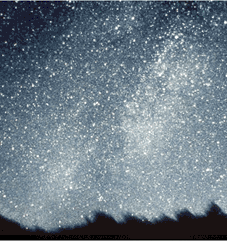|
DARK SKY:
Keeping our
sky dark goes much further than allowing both professional and amateur
astronomers to do their research work and for all of us to see the
stars. We should realize that sky glow is also a visible sign of
unprofessional lighting that wastes energy and as such contributes to
CO2 emissions and the connected climate change. When we consider
restriction of light pollution we should see it in the context of
sustainability for which I use the definition "balancing
the positive effects of lighting on living beings with the impact of
that lighting on the environment". Night-time lighting can contribute to
safety, security, and quality of life. As such it is essential for our
society. Only professional, carefully designed, lighting that brings the
light only there where it is really needed and only when it is really
needed fulfils the requirement of sustainability.

Stars in a dark sky environment. Source: David Crawford.
Click to enlarge. |
Wout van Bommel has participated in the work of a Technical
Committee of CIE (Commission Internationale de l'Eclairage) that published in 2003 the Guide on
limitation of obtrusive light. Representatives of the
International Dark-Sky Association (IDA, of which van Bommel is a Board member since 2008) have also
contributed. This guide has been used as a
basis for national recommendations on light pollution
restriction in many different countries. Especially with the rapid growth of LEDs in outdoor
lighting and with more insight in the technical details of
light pollution, the recommendations have to be revised.
Wout van
Bommel was board member of IDA in 2008 and 2009.
|
|